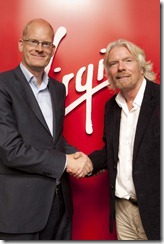Virgin Group and regional mobile virtual network operator (MVNO) Friendi Group today announced the signing of a strategic partnership agreement for the Middle East and Africa. Subject to local authority clearances, the two groups will merge their regional telecom operations to create a combined entity to be called Virgin Mobile Middle East & Africa (VMMEA), which will develop and operate mobile telecommunications businesses across the region.

Virgin Group operates Virgin Mobile-branded MVNOs across eight countries including South Africa, and the agreement with Friendi Group will see Virgin Group become the single largest shareholder in the combined VMMEA entity, having contributed its stake in its South African entity, Virgin Mobile South Africa, and some cash to the new entity. Virgin Group will hold a large minority stake in VMMEA upon completion of the transaction.
Left – Mikkel Vinter, founder and CEO of Friendi Group, right – Richard Branson, founder and CEO of Virgin Group
Virgin Mobile South Africa was launched in 2006 as a 50:50 joint venture between the Virgin Group and local mobile operator, Cell C.
In February 2011, Cell C sold its stake, with Virgin Group picking up an additional five per cent and Calico Investments of the Bahamas acquiring the remaining 45 per cent. Virgin Mobile South Africa counts approximately 400,000 active subscribers.
Friendi Group operates MVNOs in Oman and Jordan, and a ‘B-brand’ channel in Saudi Arabia, and has always expressed interest in advancing across the region since its launch in 2006. Friendi Group’s founder and CEO Mikkel Vinter will lead the newly established VMMEA, which will be headquartered in Dubai.
“We are obviously pleased to have reached this agreement with Virgin Group, which I believe comes at an opportunistic time with respect to the development of MVNOs in our region,” Vinter told Comm. exclusively. “With large markets such as Saudi Arabia and Egypt moving towards the implementation of MVNOs this is a fantastic time for the region’s most recognised and experienced players to come together and offer the best services available.”
Vinter said the current operational entities under VMMEA shall maintain their respective brand names, though going forward; either or both brands may be used in a new market, depending on the demographic being targeted.
Virgin Group has attempted to operate in the Middle East previously, having launched Virgin Mobile branded services in partnership with Qtel in Qatar in 2010. Within 18 months of launch the service was disbanded on instruction of the telecom regulator in Qatar, on the grounds that Virgin Mobile was not licensed to provide reseller services in the country.




